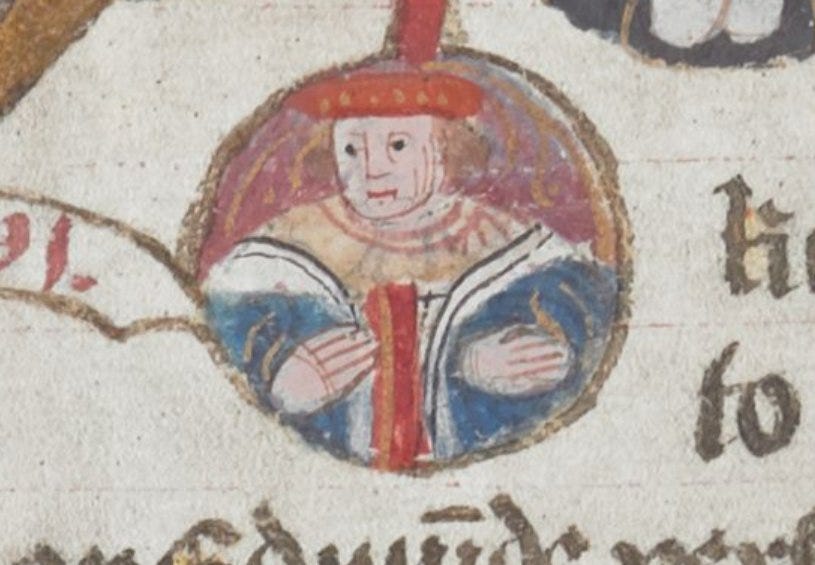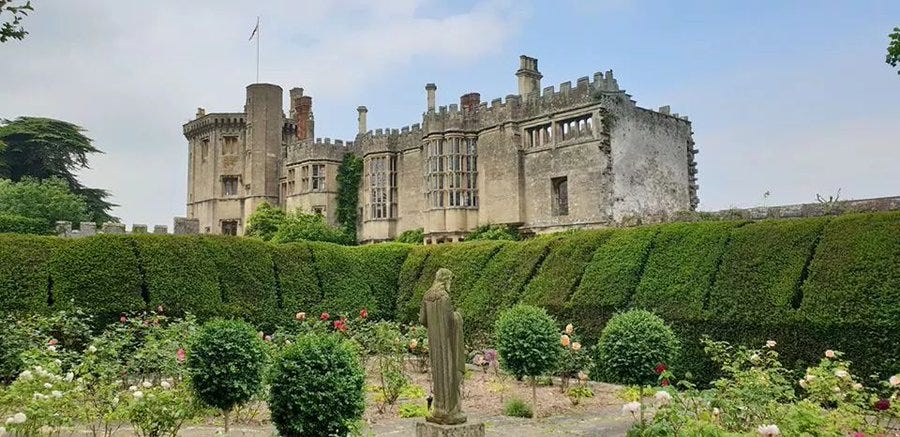Jasper Tudor, the 'Good Duke'
On 21 December 1495, the great survivor of the Wars of the Roses died.
On 21 December 1495, the great survivor of the Wars of the Roses, ‘the high and mighty prince’ Jasper Tudor, ‘brother and uncle of kings’, died peacefully in his own bed at Thornbury Castle. It is a testament to his incredible resilience that he did so a wealthy royal duke in his sixties, escaping death on the chopping block or in battle like most of his contemporaries.
Few lives contain the drama of Jasper’s, which I recount in full in my upcoming Tudor family biography, ‘The Son of Prophecy: The Rise of Henry Tudor (now available for pre-order)’. His unyielding loyalty to his family and instinct for survival against substantial odds were key characteristics which ensured the unlikely accession of the Tudors to the English throne, completing their transformation from Welsh rebels to kings of England.
For guiding his nephew Henry to safety when the latter was vulnerable fourteen-year-old boy, and surviving the arduous years of two lengthy and selfless exiles that totalled nearly a quarter-century, Jasper was rewarded well when Henry acceded to the throne.
At the coronation, it was he who was entrusted to carry his nephew’s newly won crown through Westminster Abbey, and when Elizabeth of York was crowned two years later, Jasper accompanied his niece-by-marriage from the Tower of London on a horse whose caparison was lavishly decorated with red dragons.
From the outset of his reign, Henry made sure to honour the uncle who had given so much for so long. Jasper’s earldom of Pembroke was formally returned to him, and granted anew was the prestigious dukedom of Bedford.
In the preamble creating his uncle a duke, Henry considered ‘how great are the services which our most beloved uncle Jasper, Earl of Pembroke, has heaped upon us’, and mindful of the great dangers the latter encountered in keeping Henry ‘safe from our childhood right up to this time’, it was clear he was a man ‘worthy to be raised to a higher grade’.
Landed rewards and offices were also forthcoming. Jasper was restored to all his Welsh estates, including the lordships of Pembroke, Cilgerran, Llansteffan, St Clears, Ystlwyf, and Trane Clinton, as well as Caldicot, which one had belonged to his mother Katherine of Valois.
Other rewards were the manors of Westley in Suffolk and Witley in Surrey, and Solihull, Sheldon, Bolsover and Clipstone in the English Midlands. Jasper was also granted for life lands across the Severn Valley, including Minster Lovell in Oxfordshire and Sudeley Castle in Gloucestershire, and would hold the constableships of the castles of Monmouth, Skenfrith, Grosmont, and Whitecastle.
He was also appointed, for life, Justiciar of South Wales, which made him in effect vice-regent in the region, answerable only to the king, and lieutenant of Ireland. Perhaps his most integral role was as de facto leader of the Council of Wales and the Marches during the minority of his great-nephew Prince Arthur, entrusted to maintain stability in the region. Apart from his mother, Jasper was the one person Henry knew he could completely trust with such extensive powers.
He was also provided a wife. To strengthen the Tudor alliance with the Woodvilles, on 7 November 1485 Jasper married Katherine, the dowager duchess of Buckingham and younger sister of the dowager queen, Elizabeth Woodville.
It was a marriage that mirrored his nephew’s in some ways, the union of a Lancastrian to a prominent Yorkist-aligned bride. There is no suggestion the marriage was anything other than a political alliance, and no children were born to the pair during their decade together.
Jasper slowed down in later life, and spent much of the early 1490’s in semi-retirement in the West Country, occasionally hosting his nephew at Minster Lovell. His will was written and signed at Thornbury Castle, a palatial home that belonged to his stepson, on 15 December 1495, with Henry VII named his chief heir.
In his will, Jasper bequeathed his soul 'to almighty god, to our blessed lady the mother the virgin Mary, and to all saints’ and directed his body ‘to be buried in our lady the monastery of Keynsham'. He also arranged in his will for four priests to ‘to sing perpetually in the said church and monastery for my soul and for my father’s soul as for the souls of the noble memory Katherine, sometime Queen of England, my mother, and of Edmund, late Earl of Richmond, my brother and of all other my predecessor'. In memory of his father Owen Tudor, the Greyfriars in Hereford where he was buried received one of Jasper’s cloths of gold and a payment of £20. Jasper died six days later.
When Henry VII was informed of Jasper’s death, the king immediately travelled down to the Keynsham in Somerset for the interment, taking with him his queen for moral support. The mayor of Bristol had arranged for two thousand men on horseback to accompany the duke’s coffin, for which he received thanks from the king.
No trace of Jasper’s tomb survived the Dissolution, nor indeed has anything of Keynsham itself, although Henry VII did found in his uncle’s memory in Thornbury, where his entrails were buried.
Despite being the great-uncle of Henry VIII and instrumental in propelling the family to unfathomable heights, Jasper was sadly quickly forgotten after his death. His steadfast loyalty to his kin, redoubtable courage in the face of great danger, and tenacity which put lesser mortals to shame, have only recently been recognised.
He was, at least, warmly recalled in 1578 by the Welsh antiquarian Rice Merrick as, quite simply, ‘the good duke’.
Merrick, in fact, records a story, likely apocryphal, that nevertheless perhaps best underscores Jasper’s lasting legacy. According to Merrick, shortly after landing at Mill Bay in 1485, a very old woman approached the earl of Pembroke and said to him ‘Long mayst thou live! For thou hast better kept thy nephew, than King Richard kept his’.
Whether Richard III can truly be blamed for the disappearance and probable murder of his nephews or not, there is no doubt that Jasper did protect his own nephew well. Jasper is, arguably, the mightiest of all the Tudors, a luminary who gave everything he had so that others could strive for greatness.





